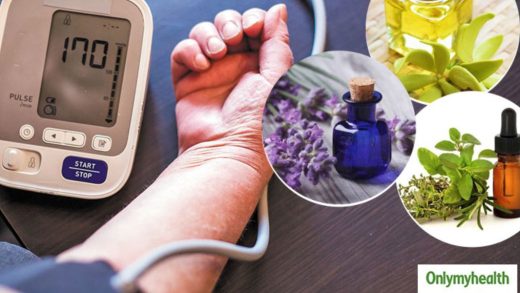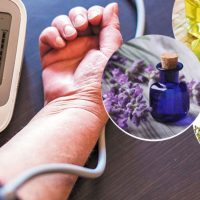Coffee is by far one of the liquids that is consumed the most frequently all over the world. Coffee contains caffeine, which is also present in other beverages such as tea, sodas, and energy drinks. Caffeine is the primary component of coffee.
There are a lot of people who drink caffeine in order to boost their performance, as well as their mental sharpness and memory. Other medical disorders that can be treated with it include migraines or severe headaches, attention-deficit/hyperactivity disorder (ADHD), asthma, gallbladder disease, low blood pressure, and depression. According to the findings of a few research, caffeine has the ability to shield brain cells and may also lower the chance of developing Alzheimer’s disease and Parkinson’s disease.
As a result, caffeine consumption can have an impact on a wide variety of over-the-counter and prescription medications, which can result in substantial drug interactions.
In this piece, we will discuss the interactions that can occur between coffee and several medications. We hope that by the end of this article, you will have a better understanding of how drinking coffee can impact your prescriptions and which medications can interact with caffeine.
So, what effects does caffeine have on the body?

Caffeine is a stimulant that acts on the central nervous system. It is able to pass through the blood-brain barrier and stimulates the functioning of the brain. The levels of adrenaline and cortisol in the blood are also somewhat elevated as a result of this. Cortisol is the principal stress hormone in the body. This is the reason why individuals who consume caffeine report feeling more alert, focused, and rejuvenated after doing so.
Additionally, caffeine has an effect on other organ bodies. For instance, it can trigger twitching in the muscles, raise blood pressure, and increase the amount of acid that is secreted by the stomach. In addition to this, caffeine is regarded as a mild diuretic. Caffeine causes the kidneys to no longer reabsorb water, which results in an increase in the amount of urine that is produced.
It is possible for caffeine to have significant cardiovascular consequences, including irregularities in cardiac rhythm, when consumed at higher doses. If you consume a significant amount of coffee on a regular basis, there is a possibility that your bone mineral density will decrease, which is also known as bone thinning.
What is the safe amount of caffeine consumption in a day?
For people who are in good health, the Food and Drug Administration of the United States deems a daily consumption of 400 milligrams of caffeine to be safe. That’s equivalent to around two shots of energy drinks, ten cans of soda, or four cups of coffee that has been brewed. Because the amount of caffeine that is included in beverages that contain caffeine can vary greatly from one brand to another, it is essential to verify the labels of those beverages.
What impact do beverages containing caffeine have on drugs?
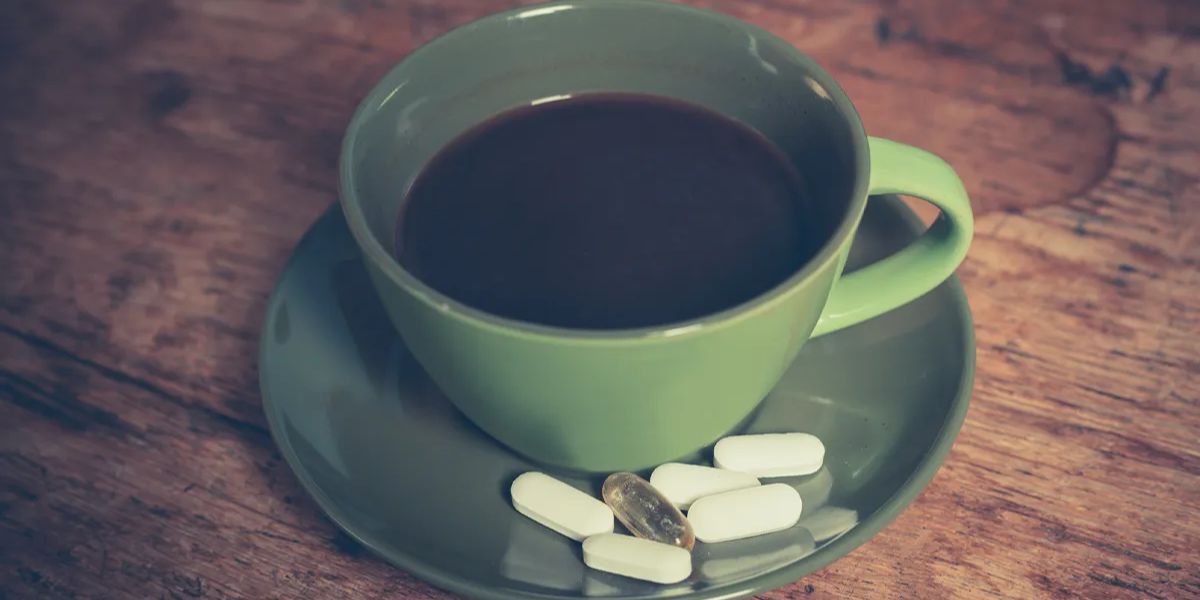
According to a number of studies, the ingestion of caffeine can have an impact on the absorption, distribution, metabolism (breakdown), and excretion of a wide variety of therapeutic agents.
Caffeine interactions with pharmaceuticals have the potential to exacerbate the adverse effects of the medications, which may result in toxicity or a reduction in the efficacy of the therapeutic therapy.
Diuretic medications, sometimes known as water pills, are known to lower potassium levels. Additionally, caffeine is known to lower potassium levels; therefore, combining the two can result in low potassium levels in the blood.
Because of this, it is essential to adhere to the directions that your physician and pharmacist provide regarding the right amount of caffeine consumption while you are taking specific prescription medications.
Medications that you should never mix with coffee
Not everyone may consume this well-known beverage. It is important to exercise caution if you are already taking specific medications since the consumption of coffee and other kinds of caffeine might cause adverse effects that can be quite harmful.
Below is a list of some medications that interact with coffee, as well as the potential implications of consuming both of these substances.
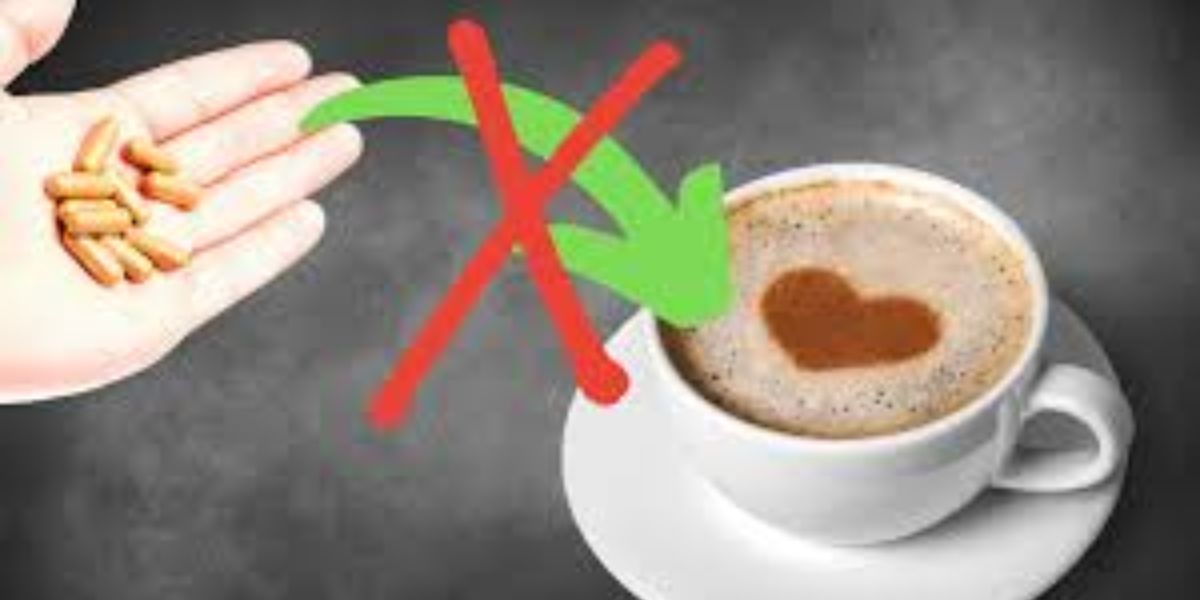
Ephedrine:
Ephedrine is a stimulant chemical renowned for its ability to increase nervous system activity. Its main applications include acting as a decongestant and bronchodilator to relieve breathing problems. It is also used to treat a variety of ailments, including low blood pressure, narcolepsy, and menstruation issues.
While caffeine, found in coffee, has similar stimulant qualities to ephedrine, mixing the two can pose serious health hazards. Health experts, including those at the Mayo Clinic, strongly warn against combining ephedrine with coffee due to the risk of side effects. Consuming both medications concurrently can result in hazardous blood pressure rises, increasing the risk of heart attacks, strokes, and even seizures.
Given the potential for serious health consequences, it is critical to exercise caution and avoid taking ephedrine with coffee or other caffeinated beverages. Individuals should always follow medical advice and contact with healthcare specialists before taking ephedrine-containing drugs, especially if they take coffee on a daily basis.
Thyroid Medicine
If you have hypothyroidism, your thyroid gland, which is a butterfly-shaped gland near the front of your neck, does not produce enough thyroid hormone. This can lead to weight gain, dry skin, joint pain, hair loss, and irregular menstrual cycles.
Many people are administered levothyroxine or other thyroid drugs to assist regulate their hormones. According to studies, consuming coffee while taking thyroid medication can limit the amount of medicine absorbed by your body, making it less effective for you. And that is not a minor effect: Patient case reports reveal that coffee can inhibit thyroid medication absorption by more than half.
Cold or allergy medication
Millions of individuals take cold and allergy medications, which frequently include central nervous system stimulants such as pseudoephedrin. Coffee is also a stimulant, so drinking it with your allergy medication may exacerbate symptoms such as restlessness and difficulty sleeping.
Some allergy medications, such as fexofenadine, should not be taken with coffee because it can overstimulate your central nervous system, exacerbating the symptoms of restlessness. It’s usually a good idea to consult your doctor before combining coffee with cold or allergy medication.
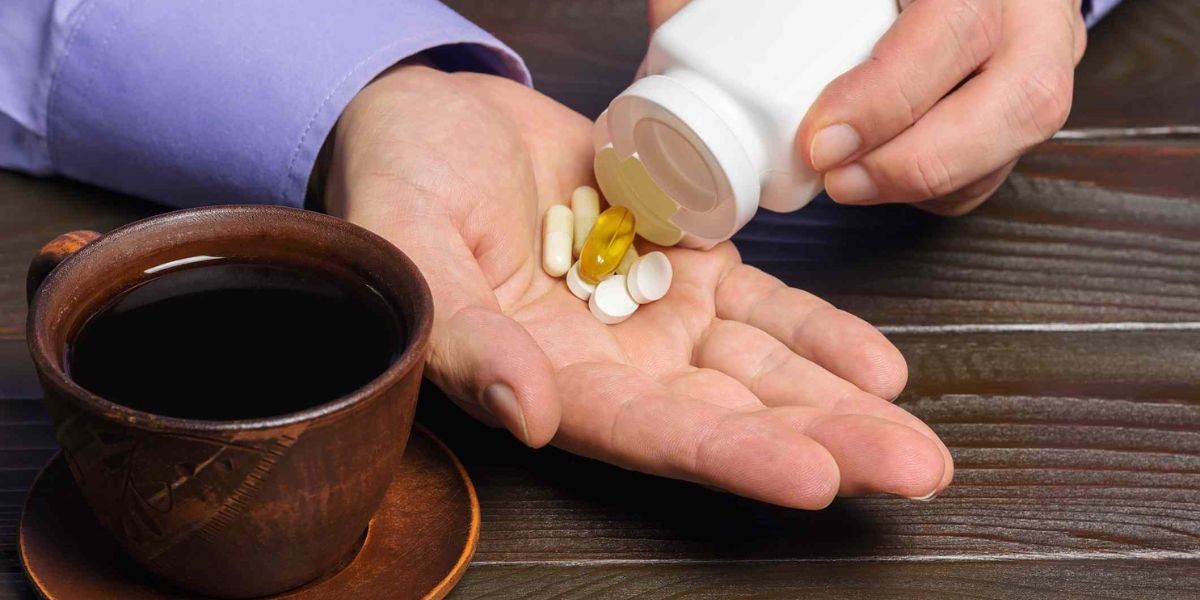
Diabetes Medicine
If you add sugar or milk to your coffee, it may cause a blood sugar surge and impair the effectiveness of your diabetes medications. Furthermore, research suggests that caffeine may exacerbate diabetes symptoms.
According to research released by the American Diabetes Association, drinking caffeine-containing beverages, such as coffee, may boost insulin and blood sugar levels. The study was small, so additional research is needed, but the researchers cautioned that drinking too much coffee could make blood sugar management more difficult and increase the risk of diabetes complications.
Diabetes and prediabetes are extremely frequent in the United States and other Western countries. According to the Centers for Disease Control and Prevention (CDC), over 37 million Americans have diabetes, with approximately 100 million having prediabetes. Most people are unaware they have it. Given those statistics, it’s no surprise that millions of Americans use diabetes drugs on a daily basis.
Alzheimer’s medication
Alzheimer’s disease is the seventh greatest cause of death in America, primarily affecting persons over the age of 65. It is a brain illness that causes a loss of cognitive function, making it harder to think, remember, and carry out daily duties. Millions of Americans suffer from Alzheimer’s disease and use medicine to manage the condition.
Caffeine affects Alzheimer’s medicines such as donepezil, rivastigmine, and galantamine. Coffee contains caffeine, which tightens the blood-brain barrier and reduces the amount of medication that reaches your brain. Alzheimer’s drugs function by protecting the neurotransmitter acetylcholine, and excessive coffee consumption has been demonstrated to reduce that protective effect.
Asthma medication
Asthma is a chronic lung illness that causes your airways to become inflamed and irritated. This causes trouble breathing, coughing, wheezing, and a tight feeling in your chest. Millions of Americans, both adults and children, suffer from asthma and use drugs to treat it.
Many asthmatics use bronchodilators during a flare-up, such as aminophylline or theophylline. Bronchodilators function by relaxing the airways, making breathing easier; nevertheless, they might cause headaches, restlessness, stomach pain, and irritation. Drinking coffee or other caffeine-containing beverages may raise your risk of experiencing these side effects. Coffee might also lower the amount of medication absorbed and utilized by your body.
Osteoporosis medication
Osteoporosis thins and weakens your bones, increasing your risk of bone breakage. Osteoporosis affects millions of people, and it is most frequent in women, particularly those who have gone through menopause.
Drugs that prevent and treat osteoporosis, such as risedronate or ibandronate, should not be used with coffee since it reduces the drug’s effectiveness. It is recommended that you take these prescriptions before eating or drinking anything and that you wash the pill down with simple water. This allows your body to absorb the full amount of drugs. Drinking coffee while taking these drugs can diminish their effectiveness by more than half.
Antidepressants
According to the CDC, one out of every ten youths and adults takes antidepressants on a daily basis. They are the most commonly prescribed medications for adults in their twenties and thirties, and their use has grown substantially over the last few decades. They can assist with depression, a mood illness that impairs how you feel and perform.
Coffee can influence how your body processes antidepressant drugs. Some medicines, such as fluvoxamine, amitriptyline, escitalopram, and imipramine, can be metabolized differently if consumed concurrently with coffee, particularly in significant quantities. Coffee might lower the quantity of drugs absorbed by the body.
According to studies, fluvoxamine, in particular, has been observed to exacerbate caffeine’s regular adverse effects. This might lead to symptoms such as sleeplessness and heart palpitations. It’s advisable to take your prescription and avoid coffee for a bit.
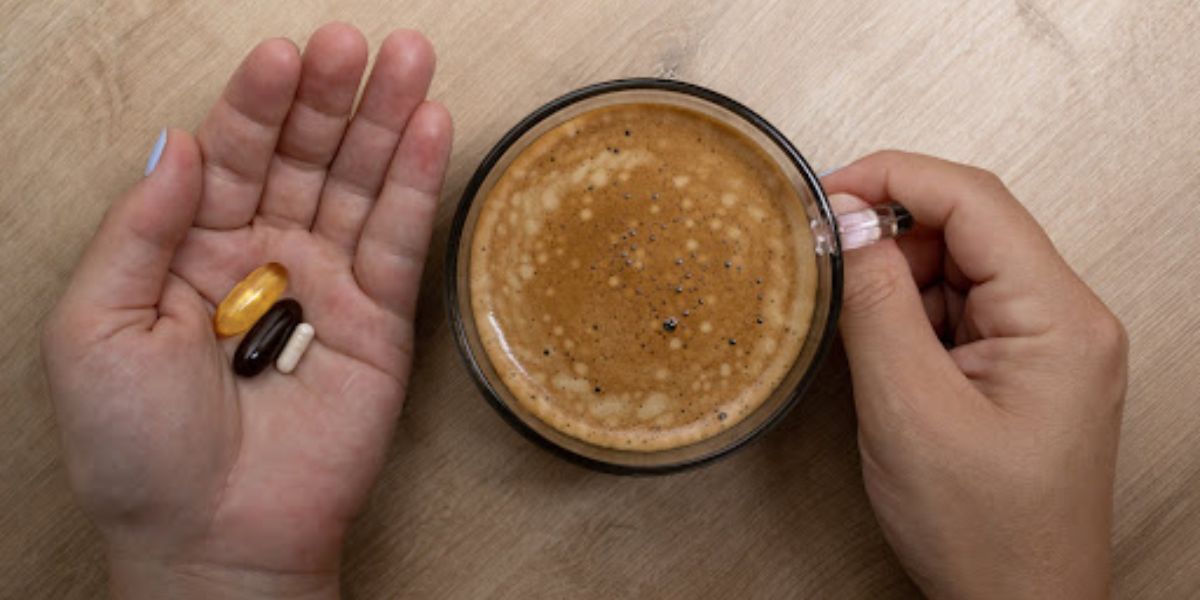
Antipsychotic Medicine
Antipsychotic medications can benefit persons with schizophrenia, mania, major depressive disorder, and other mental illnesses. Every year, about four million Americans use these drugs. Antipsychotic drugs act by suppressing certain neurotransmitters or blocking receptors in the brain.18
Phenothiazine, clozapine, haloperidol, and olanzapine are all medications used to treat psychosis. Coffee can cause your body to absorb fewer of these medications than it would if you waited a bit to have your daily cup of coffee. According to studies, the body metabolizes or breaks down several of these drugs differently when exposed to coffee. To maximize the effectiveness of your drug, take it with water rather than coffee.
Blood pressure medication
According to the CDC, tens of millions of Americans suffer from hypertension (high blood pressure), and many of them do not have it under control. Hypertension raises your risk of heart disease and stroke. It’s a prevalent yet quiet disease because it rarely causes symptoms.
Many people take blood pressure drugs such as verapamil or propranolol, which act by decreasing the heart rate. This means that your heart does not have to work as hard to provide blood to all of your body’s cells.
However, drinking coffee while taking blood pressure drugs such as felodipine may cause your body to absorb less of the medicine. You may not receive the full benefits of the medication. Consult your doctor about how to time your medications and your morning cup.
Melatonin
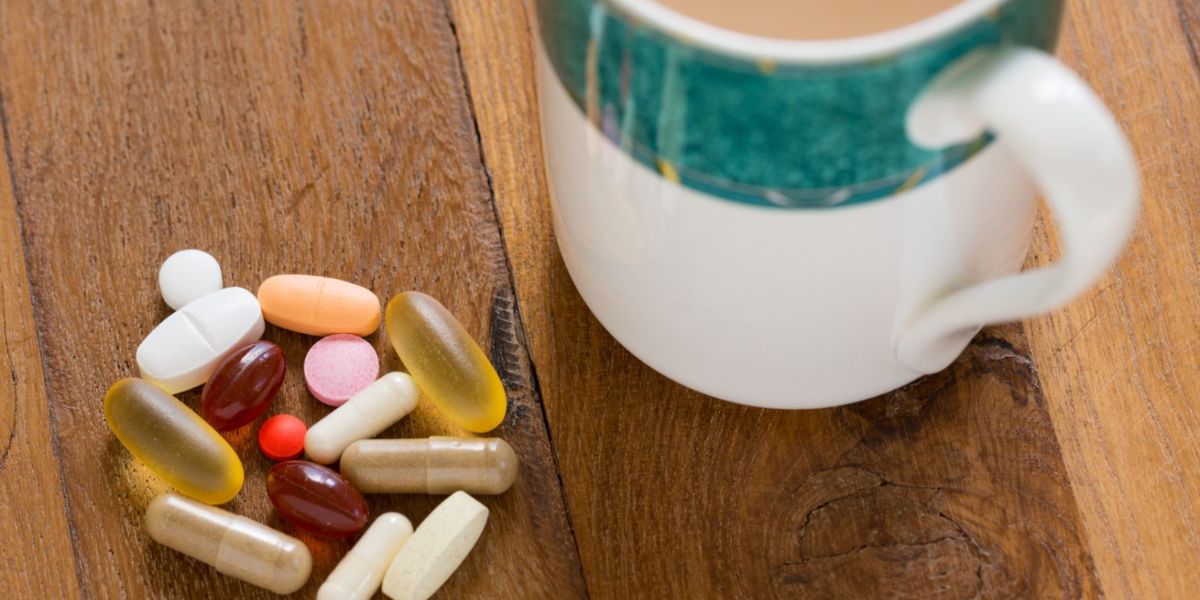
Melatonin is a naturally occurring hormone that helps you sleep at night. The hormone is released when the sun goes down, signaling to your brain that it’s time to rest. Melatonin is also available over the counter (OTC) in supplement form and is used as a sleep aid.
In contrast, coffee acts as a stimulant, making you feel more alert. Coffee contains caffeine, which has the opposite effect as melatonin. It can increase your alertness and make it difficult to fall asleep. Drinking coffee can reduce melatonin production in the body, making the hormone less efficient. If you take melatonin and consume coffee at the same time, the effects may cancel out.
When to Visit a Healthcare Provider?
If you take any of these medications, especially if they are intended to be taken first thing in the morning, consider delaying your first cup of coffee.
If you take more than one medicine, consult your doctor about how to balance your pills and coffee. If you’re having any unpleasant side effects, such as restlessness, jitteriness, or insomnia, your doctor can help you find a solution.
Conclusion
Coffee has a high caffeine concentration, which makes it a stimulant. Coffee, due to its stimulant properties and effects on your gastrointestinal tract, might alter how your body breaks down and absorbs drugs. You may only need to adjust the schedule of your coffee break, but if you are suffering any symptoms, you should see your healthcare physician.

